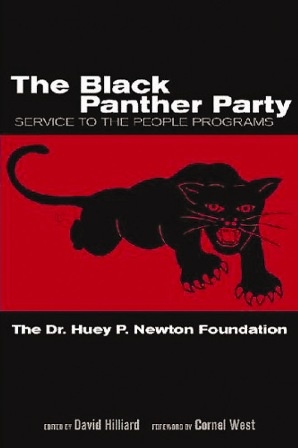 David Hilliard, former leader of the Black Panther Party, appears in Beaverton this Saturday, May15, from 3 to 9 p.m., to autograph copies of his book, "The Black Panther Party: Service to the People Programs," at A'Kasha, 4505 SW Watson St. in Beaverton.
David Hilliard, former leader of the Black Panther Party, appears in Beaverton this Saturday, May15, from 3 to 9 p.m., to autograph copies of his book, "The Black Panther Party: Service to the People Programs," at A'Kasha, 4505 SW Watson St. in Beaverton.
The art school and gallery will also be featuring black and white photographs of the Black Panthers from the late 1960s to 70s by local photographer Eve Crane.
Hilliard's book, which includes a forward written by Professor Cornel West, chronicles public service programs run by the Black Panthers in cities and towns around the country in the 1960s and 70s.
The Panthers provided services including schools, nutrition programs, free medical clinics staffed by accredited medical professionals, legal aid, senior citizen programs, clothing closets and the Sickle Cell Anemia Research Foundation, run by Oakland Children's Hospital.
Hilliard has written and edited many books about the Panthers' legacy, from his position at the helm of the Huey P. Newton Foundation.
He describes "The Black Panther Party: Service to the People Programs" as a critical blueprint for community empowerment that is just as timely today as it was 40 years ago.
The Skanner News spoke to Hilliard about the Panthers' other main issue – police accountability.
 The Skanner News: Do you have a sense of the state of police accountability movement around the country Do you think there have been any breakthroughs in police violence against communities of color?
The Skanner News: Do you have a sense of the state of police accountability movement around the country Do you think there have been any breakthroughs in police violence against communities of color?
Hilliard: Well certainly there's been some progress. Our Black Panther Party's primary focus, it called for immediate end to police murder and brutality of Black people in our communities. It's really what the Black Panther Party is known for, these Black Panther confrontations, which in some ways was really not the issue. It was really the police against the Black community not the police against our movement. We were a part of the community.
It was our Black Panther Party that implemented community control with these political referendums, a referendum that I should say we implemented in the city of Berkeley in 1968. And that is pretty much a model that's being used around the country although many people don't give us credit for it, where we called for police accountability, where we called for that police that patrolled our community  should live in our community. We were then asking for residential requirements for people who came into the police department, as a reduction for the violence against people in the community.
should live in our community. We were then asking for residential requirements for people who came into the police department, as a reduction for the violence against people in the community.
We called for adding more women to the police force, and our particular demographic, when I joined the Black Panther Party here locally there were only two Blacks on the police department since then there's been two or three African American police chiefs. As it is now in the city of Oakland there's women on the department, there are gays, Hispanics, people of color.
So there is a model, there is the model of our Black Panther Party that I think should be looked at in these cities where there is a profound incidence of violence against minorities. It is something that I would certainly speak to and remind people that there is a model, our particular referendum on community control of the police that might act as a solution, put an end and cease hostilities of police against people of color.














































































































































































































































































































